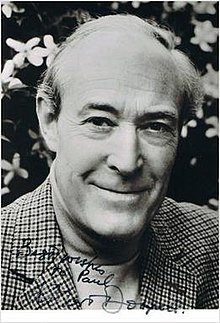Robert Dougall
| Robert Dougall MBE | |
|---|---|

Robert Dougall
|
|
| Born |
27 November 1913 Croydon, Surrey, England |
| Died | 19 December 1999 (aged 86) Southwold, Suffolk, England |
| Occupation | Broadcaster Ornithologist |
| Years active | 1934–1999 |
| Spouse(s) | Nan Byram (1947-1999; his death) |
| Children | 2 |
| Relatives |
Rose Elinor Dougall (granddaughter) Tom Dougall (grandson) |
Robert Dougall, MBE (27 November 1913 – 19 December 1999) was an English broadcaster and ornithologist, mainly known as a newsreader and announcer.
Dougall was born and educated in Croydon, Surrey. He attended Whitgift School but did not carry on to university despite having some talent in languages, specifically French and German. He joined the BBC initially in the accounts department, but soon found a job as an announcer for the BBC Empire Service (the predecessor of the BBC World Service) on his 21st birthday in 1934. By 1939, he had risen to the position of senior announcer and his was the voice that announced to the world Britain's declaration of war on Germany in September of that year. Shortly before this announcement, he had transmitted a message as an "anonymous" Englishman (although speaking in German), imploring Germany to withdraw its forces and avert the impending conflict:
Dougall worked as a radio reporter during the early part of the Second World War, but also served with the Royal Navy from 1942. He resumed his broadcasting career after demobilisation in 1946 as an announcer and newsreader for the BBC Home Service. In 1947, Dougall was appointed Programme Manager for the BBC's Far Eastern Service, a position which required him to move to Singapore.
Dougall's radio work took a back seat when he returned to London in 1951 to work as a television newsreader. (He is thought to have been the only person from the BBC's early radio service who had an enduring career in television.) Between 1946 and 1955, the BBC news was merely voiced over a photograph of Big Ben, a measure sanctioned by Chief News Editor Tahu Hole to reinforce the absolute impartiality for which the Corporation was renowned. However, the coming of commercial television and ITN in 1955 prompted the BBC to have its newsreaders perform to camera - indeed, they began this approach only three weeks before ITN began transmission. Dougall was among the first of these newsreaders to appear in-vision in 1955 (the others were his contemporaries Kenneth Kendall and Richard Baker with Kendall being the very first). Dougall presented general BBC news reports and the Newsroom programme during the 1960s and was appointed a Member of the Most Excellent Order of the British Empire (MBE) in 1965, receiving his honour on the same day as the Beatles. He was the first person to present the long-running BBC Nine O'Clock News in 1970, continuing in this role until his retirement from the newsroom in 1973.
...
Wikipedia
